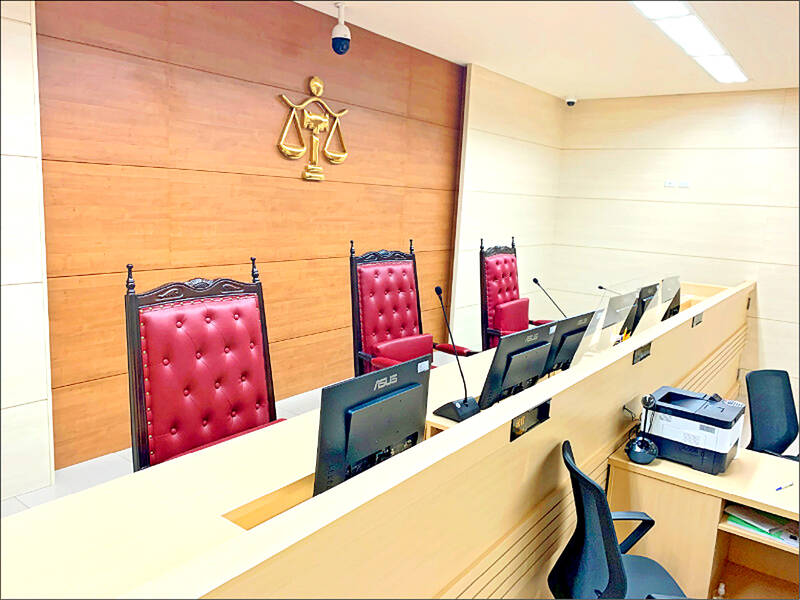A Legislative Research Bureau report recommends that under special circumstances major misconduct or offenses by soldiers could be addressed by a provisional military court to expedite trials.
Military officials and experts have said that the restoration this year of one-year compulsory military service would likely lead to more incidents of fighting and insubordination, and without military tribunals, which were abolished in 2013, they would be unable to quickly address certain offenses.
The current civilian court system could take too long to address matters, which would negatively affect troop morale, therefore the government must finds ways to expedite the trial process for soldiers, the bureau’s report said.

Photo: Taipei Times
The report gave two recommendations to hasten trials of soldiers.
The first recommendation calls for addressing contraventions of the Criminal Code of the Armed Forces (陸海空軍刑法) in a provisional setup under the Military Trial Act (軍事審判法).
The second recommendation is for legislators to propose amendments to the Criminal Speedy Trial Act (刑事妥速審判法) to add provisions that allow the civilian court system under special circumstances to hear major incidents of military insubordination or breaches of military disciplinary regulations.
On Jan. 25, the first group of soldiers under the new one-year conscription program started their service, and they have already received a lecture from a military legal office about law and discipline, the report said.
The bureau conducted a study on major military misconduct cases, with the need for speedy trial and legal procedures, which included an assessment by the Supreme Prosecutors’ Office that more incidents of violence and insubordination would be expected under the extended compulsory service, which could seriously affect war preparation efforts, it said.
It concluded that for public prosecutors to investigate major contraventions of the Criminal Code of the Armed Forces, a system to ensure speedy trials is needed, and courts need to impose severe penalties in such cases to maintain discipline and morale.
In 2013, the legislature amended the Military Trial Act, making public prosecutors and the civilian court responsible for military misconduct and contraventions, in accordance with the Code of Criminal Procedure (刑事訴訟法).
However, military legal officers have the expertise to efficiently handle such cases, while the prosecution of a case in a civilian court could complicate matters and not act as a sufficient deterrent for insubordination, the report said.
Nevertheless, military officials and the public still have differing views on the applications of a military tribunal, and therefore have different ideas about how to expedite legal procedures in the armed forces, it said.
One way is to set up a military court for special cases involving active soldiers who have contravened specific regulations, such as those involved in leaking military secrets, major insubordination or assault of a superior officer. The court could then recommend a supervising body to handle such cases under the act, which could require an amendment, it said.

Alain Robert, known as the "French Spider-Man," praised Alex Honnold as exceptionally well-prepared after the US climber completed a free solo ascent of Taipei 101 yesterday. Robert said Honnold's ascent of the 508m-tall skyscraper in just more than one-and-a-half hours without using safety ropes or equipment was a remarkable achievement. "This is my life," he said in an interview conducted in French, adding that he liked the feeling of being "on the edge of danger." The 63-year-old Frenchman climbed Taipei 101 using ropes in December 2004, taking about four hours to reach the top. On a one-to-10 scale of difficulty, Robert said Taipei 101

Nipah virus infection is to be officially listed as a category 5 notifiable infectious disease in Taiwan in March, while clinical treatment guidelines are being formulated, the Centers for Disease Control (CDC) said yesterday. With Nipah infections being reported in other countries and considering its relatively high fatality rate, the centers on Jan. 16 announced that it would be listed as a notifiable infectious disease to bolster the nation’s systematic early warning system and increase public awareness, the CDC said. Bangladesh reported four fatal cases last year in separate districts, with three linked to raw date palm sap consumption, CDC Epidemic Intelligence

US climber Alex Honnold left Taiwan this morning a day after completing a free-solo ascent of Taipei 101, a feat that drew cheers from onlookers and gained widespread international attention. Honnold yesterday scaled the 101-story skyscraper without a rope or safety harness. The climb — the highest urban free-solo ascent ever attempted — took just more than 90 minutes and was streamed live on Netflix. It was covered by major international news outlets including CNN, the New York Times, the Guardian and the Wall Street Journal. As Honnold prepared to leave Taiwan today, he attracted a crowd when he and his wife, Sanni,

Taiwanese and US defense groups are collaborating to introduce deployable, semi-autonomous manufacturing systems for drones and components in a boost to the nation’s supply chain resilience. Taiwan’s G-Tech Optroelectronics Corp subsidiary GTOC and the US’ Aerkomm Inc on Friday announced an agreement with fellow US-based Firestorm Lab to adopt the latter’s xCell, a technology featuring 3D printers fitted in 6.1m container units. The systems enable aerial platforms and parts to be produced in high volumes from dispersed nodes capable of rapid redeployment, to minimize the risk of enemy strikes and to meet field requirements, they said. Firestorm chief technology officer Ian Muceus said